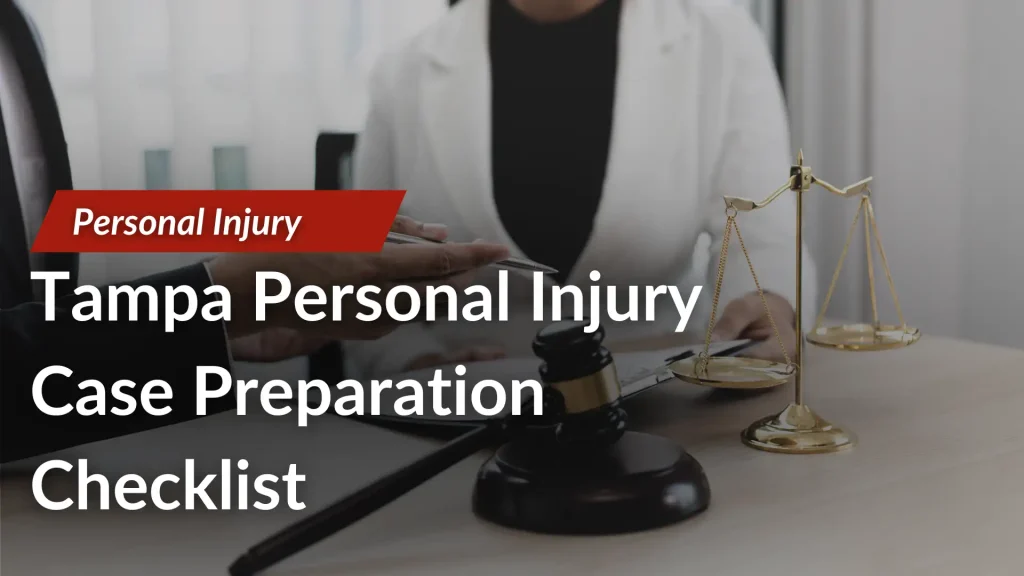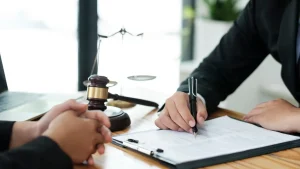 The aftermath of a personal injury accident in Tampa can be a whirlwind of medical appointments, insurance claims, and emotional turmoil. Amidst the chaos, it’s easy to feel overwhelmed and unsure what steps to take to protect your rights and secure fair compensation. That’s where a comprehensive personal injury case checklist comes in.
The aftermath of a personal injury accident in Tampa can be a whirlwind of medical appointments, insurance claims, and emotional turmoil. Amidst the chaos, it’s easy to feel overwhelmed and unsure what steps to take to protect your rights and secure fair compensation. That’s where a comprehensive personal injury case checklist comes in.
The following checklist will help you and your Tampa personal injury attorney gather the necessary evidence, meet crucial deadlines, and build a strong case. Whether you’re dealing with a car accident, slip-and-fall, or any other type of accident, having a clear plan can alleviate stress and increase your chances of a successful outcome.
Organize your documents related to the accident in a folder or envelope. If your material is digital, create a digital folder and subfolders with the documents and either bring a laptop to the meeting or email the main folder to your attorney. If the personal injury case checklist below seems overwhelming, don’t worry – your lawyer will help you throughout the process.
Gathering Evidence for Injury Claims
The checklist below sets forth the main categories of documents and other types of evidence that will help strengthen your claim:
Medical Records
Collect all medical records related to your injury, including documentation of:
- Emergency room visits
- Doctor consultations
- Hospital stays
- Surgical procedures
- Physical therapy sessions
- Prescription medications
Medical Bills
Ensure you also have copies of all medical bills, including:
- Itemized statements from healthcare providers, including prescriptions, medical devices, and transportation costs for medical visits
- Receipts for out-of-pocket expenses
- Pharmacy receipts
Accident Report and Police Records
If applicable, obtain copies of:
- The police report
- Traffic citations or tickets issued at the scene
- The responding officer’s notes
- Incident report from the business or property owner
Insurance Information
Compile information from all relevant insurance policies, including:
- Your personal injury protection (PIP) coverage details (for vehicle accidents)
- The other driver’s insurance information (for vehicle accidents)
- Your health insurance information
- Any correspondence with insurance companies regarding the accident
Employment and Income Documentation
To substantiate lost wages or earning capacity claims, gather:
- Pay stubs from before and after the accident
- Tax returns and W-2 forms for the past few years
- Letters from your employer detailing missed work
- Documentation of any disability benefits
- 1099 forms if you have worked as an independent contractor
Witness Information
Collect contact information for any witnesses to the accident (passengers, bystanders, medical personnel, police officers, etc.):
- Names
- Phone numbers
- Email addresses
- Written statements or notes from conversations with witnesses
Photographic and Video Evidence
Provide any visual evidence related to the accident, including:
- Photos of the accident scene, including those that capture any hazards or conditions that contributed to the accident
- Videos (your own or those captured by bystanders, security cameras, or anyone else) illustrating the location, weather conditions, and, if applicable, any relevant traffic signals or signage
- Images of property damage or injuries
Correspondence and Communication
Bring copies of all communication related to the case, including:
- Emails and letters exchanged with insurance companies
- Text messages or social media posts related to the accident
- Any communication with the other parties involved in the accident
Repair Estimates and Receipts
If your personal property was damaged in the accident, gather:
- Repair estimates for vehicle damage or other property
- Receipts for completed repairs
- Documentation of replacement costs if the property was beyond repair
Previous Medical History
Provide your attorney with relevant medical history that might impact your case, including:
- Records of previous injuries or conditions
- Documentation of any ongoing treatments
- Information about previous claims or lawsuits related to similar injuries
Meeting with Your Attorney
While it might feel uncomfortable meeting with your attorney, your personal injury lawyer’s questions are not meant to dredge up painful memories. Instead, they are crucial for gathering the information needed to build a strong case on your behalf.
With that in mind, be prepared to discuss the following:
Overview of the Incident
Provide a detailed account of the accident, including:
- Date, time, and location
- Weather and road conditions (if applicable)
- Description of events leading up to the accident
- Actions taken immediately after the accident
Impact on Your Life
Keep a daily journal detailing your pain levels, emotional state, and any limitations you experience. Note how the injury affects your daily activities, work, and personal relationships. This personal record can be powerful evidence of the impact of the accident and your injuries on your quality of life.
Legal Goals and Expectations
Discuss your goals for the case and your expectations regarding:
- Compensation for medical expenses and lost wages
- Pain and suffering compensation
- Coverage for future medical treatments
- Any specific concerns or priorities you have
Attorney’s Assessment
Your attorney will review the provided documentation and discuss:
- The strengths and weaknesses of your case
- Potential legal strategies and approaches
- Next steps and the legal process moving forward
- Estimated timelines and important deadlines
List of Questions and Concerns
Prepare a list of questions and concerns you want to address during your meeting, such as:
- The legal process and timeline for your case
- Potential outcomes and compensation expectations
- Your role and responsibilities in the case
- Any additional evidence or documentation you might need to provide
Consider Bringing Someone You Trust to the Meeting
 Bringing a trusted friend or family member to your consultation can provide invaluable support. Their presence can offer comfort and reassurance. They can also act as an extra set of ears, taking notes and helping you recall important details afterward.
Bringing a trusted friend or family member to your consultation can provide invaluable support. Their presence can offer comfort and reassurance. They can also act as an extra set of ears, taking notes and helping you recall important details afterward.
However, it’s crucial to choose someone who will maintain confidentiality and respect the sensitive nature of the conversation. Ideally, they should be a good listener and offer emotional support without dominating the discussion or speaking on your behalf.
Having a supportive companion can significantly alleviate the stress of discussing your case by contributing to a more productive and positive experience during your consultation.
Contact a Tampa Personal Injury Lawyer to Get Started
If you’ve been injured in a Tampa accident caused by someone else’s negligence, don’t hesitate to contact the experienced team at Jurewitz Law Group Injury & Accident Lawyers. Our firm is committed to fighting for your rights and securing the compensation you deserve.
Contact us online or call us today at (619) 233-5020 to schedule a free consultation. Let us use our experience to help you achieve the best possible outcome when you file a personal injury claim.


